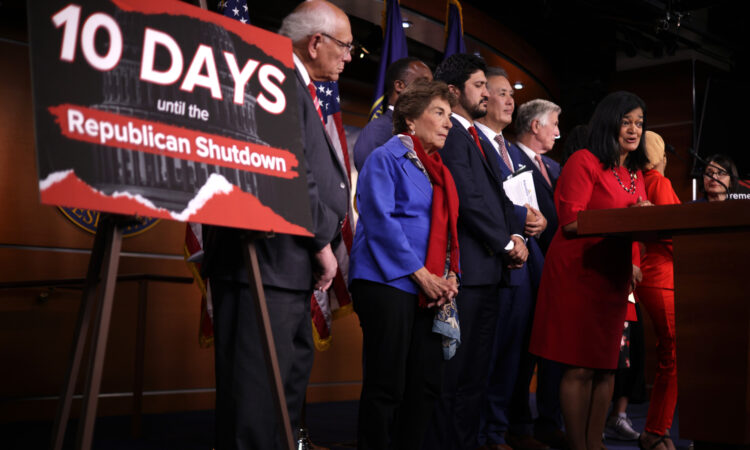
A government shutdown would add body blows to the U.S. economy, a Wall Street analyst told Newsweek, and could tip the country into a recession at a time when policymakers are working to help the world’s largest economy achieve a soft landing amid a period of high inflation and record interest rates.
Speaker Kevin McCarthy has struggled to unite the Republican-led House to move forward on spending bills that will fund the operations of the government beyond the September 30 deadline.
Should Congress fail to reach an agreement, the federal government will shut down and thousands of workers will be forced to stay home. That scenario is looking increasingly likely after McCarthy sent his members home after he failed to get a far-right faction to support another funding vote.
A potential shutdown, plus the autoworkers strike, the resumption of student loan payments and higher energy prices, form a confluence of events that could tip the economy into a recession, said Gary Schlossberg, global strategist for Wells Fargo Investment Institute.
“When you put all that together, that forms the basis of our recession forecast probabilities peaking sometime around the turn of the year,” he told Newsweek. “Our case is based on some of the body blows to the economy that we expect to see, we’re already seeing, and expect to see between now and the end of the year.”
Federal Reserve policymakers over the last year have hiked rates to blunt the effects of historically high inflation. This week, they said that they are making progress and paused hikes but indicated that they may raise rates again at least once more this year.
“Soft landing is a primary objective,” Fed Chair Jerome Powell said. “That’s what we’ve been trying to achieve.”
A soft landing is phrase analysts have employed to refer to a scenario in which the economy slows due to high interest rates but unemployment stays relatively low as inflation moderates.
Economist agree that a shutdown will cost the U.S. economy up to 0.2 percent of growth for every week the government is closed. The loss is recovered when agencies reopen and workers go back to work. But residual effects of a halt tend to reverberate, particularly in local economies, whose businesses suffer when people stay at home during shutdowns.
The potential effect of the impending shutdown will depend on how long it lasts. If the government stays closed for more than a week, the effects to growth could be felt in the fourth quarter, Schlossberg said, based on the impact of previous shutdowns.
“If past is prologue, the effect will be felt on fourth-quarter [gross domestic product], here’s a statistical effect to your front-loading the hit,” he said.”So even if you make up some of that hit, the quarter-to-quarter effect on [gross domestic product] will be a slight negative.”
The forecast of a quick bounceback is based on the assumption that the shutdown will be short-lived. The longest shutdown took place in December 2018 and lasted more than a month, but that was a partial halt of government operations.
“We had five appropriations bills already passed, which meant those departments stayed open. This time around, none of the appropriations bills have cleared Congress. So this, in all likelihood, will be a full shutdown,” Schlossberg said.
The longer the shutdown lasts, the deeper the effects on the economy, he added.
“If it goes beyond two, three weeks, we’ll make it up, but it simply needs to take a longer time to make up that lost ground, and how quickly we make it up also will be affected by some of these other elements out there, body blows, if you will, that will weaken economic activity,” he said.
Schlossberg said investors should try to see beyond any volatility that may emerge in the markets following a government shutdown.
“Our recommendation is to look through it, because it is a quick tilt to the economy, but then we subsequently adjust to that, both in the economy and the market as a whole,” he said.






